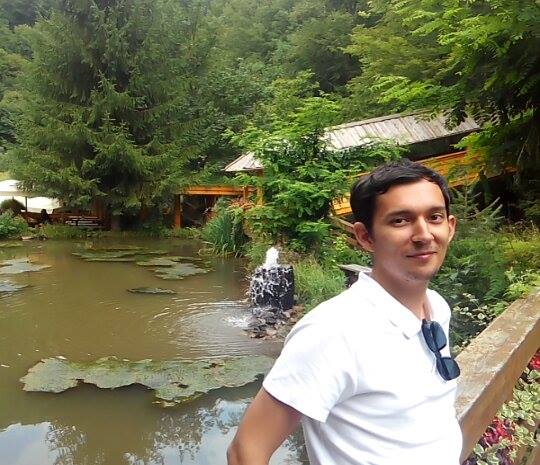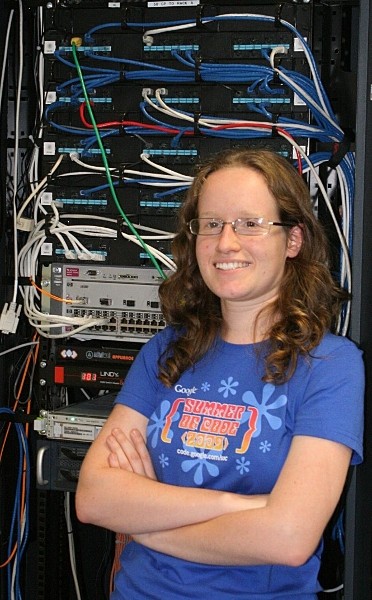Difference between revisions of "Google Summer of Code 2017 Administrative"
| (17 intermediate revisions by 2 users not shown) | |||
| Line 1: | Line 1: | ||
<center> | <center> | ||
| − | [[Image:GSoC2016Logo.jpg|400px|link=https://developers.google.com/open-source/gsoc/]] <font size="+3"> @ </font> [[Image: | + | [[Image:GSoC2016Logo.jpg|400px|link=https://developers.google.com/open-source/gsoc/]] <font size="+3"> @ </font> [[Image:Osgeo-logo.png|300px|link=http://www.osgeo.org]] |
</center> | </center> | ||
| Line 23: | Line 23: | ||
** join the #osgeo-gsoc channel on irc.freenode.net (connect directly in your browser via [https://webchat.freenode.net/?channels=osgeo-gsoc webchat]) | ** join the #osgeo-gsoc channel on irc.freenode.net (connect directly in your browser via [https://webchat.freenode.net/?channels=osgeo-gsoc webchat]) | ||
| − | * [[User:Madi|Margherita Di Leo]] acts as chair of the Admin team, which includes [[User:Masterflorin|Florin-Daniel Cioloboc]], [[User:Aghisla|Anne Ghisla]], [[Helmut Kudrnovsky]], [[User:Macho|Werner Macho]], [[Jeff McKenna]] | + | * [[User:Madi|Margherita Di Leo]] acts as chair of the Admin team, which includes [[User:Masterflorin|Florin-Daniel Cioloboc]], [[User:Aghisla|Anne Ghisla]], [[Helmut Kudrnovsky]], [[User:Macho|Werner Macho]], [[Jeff McKenna]]. Feel free to email us with any questions, we're here to help mentor the mentors as much as anything else! |
<!-- Admins: please add your pictures here --> | <!-- Admins: please add your pictures here --> | ||
| Line 355: | Line 355: | ||
=== Good ideas === | === Good ideas === | ||
| − | * '''Test students before selection.''' Challenge them with small programming tasks or bug fixes. This will help them getting familiar with the dev environment well before GSoC starts, and helps mentors understand | + | * '''Test students before selection.''' Challenge them with small programming tasks or bug fixes. This will help them getting familiar with the dev environment well before GSoC starts, and helps mentors understand their capability. Think about coding tasks much earlier than the deadline, and connect the task to the idea in the ideas page, as tasks should reflect the skills required to develop a certain idea. |
* Time management tip: Try not to mentor more than one project per year. In any case, '''you can be primary mentor only for one project.''' Consider carefully the time that you can allocate on GSoC. | * Time management tip: Try not to mentor more than one project per year. In any case, '''you can be primary mentor only for one project.''' Consider carefully the time that you can allocate on GSoC. | ||
| − | * A | + | * A former mentor reported: "In my experience, it's most effective to require an accepted pull request of developed code by end of summer and write the proposal in terms of getting there." |
| − | * It is key '''getting to know the | + | * It is key '''getting to know the students before the project starts''', in order to adapt the workload to their capabilities. In the proposal template, students are asked basic information about their background, studies and experience, but some mentors report that it can be good to get in touch via hangout or similar voip and make a sort of general interview, beside challenging them with a coding challenge. |
| − | * If the student struggles during the | + | * If the student struggles during the GSoC, get in touch and try to understand what is wrong and try to '''adjust the objectives''' according to what is possible for the student to achieve. |
| − | * It is often convenient to '''split the work into smaller tasks''' | + | * It is often convenient to '''split the work into smaller tasks''' / clear deliverables. This way, it is easier to track the progress, both for student and mentors. |
* If the student doesn't feel oppressed with nearly impossible requests, (s)he is more likely to learn with a fresh mind and '''stick in the community''' after GSoC ends and perhaps become a mentor or somehow help out with the GSoC subsequently. | * If the student doesn't feel oppressed with nearly impossible requests, (s)he is more likely to learn with a fresh mind and '''stick in the community''' after GSoC ends and perhaps become a mentor or somehow help out with the GSoC subsequently. | ||
* '''Talking in conferences''' does attract quality students to apply to GSoC | * '''Talking in conferences''' does attract quality students to apply to GSoC | ||
| − | * '''GSoC | + | * '''GSoC activities span during all year''', beside the coding, it's advertising the program, attracting students, drafting ideas, cultivating mentor capacity, etc |
* ... | * ... | ||
=== Bad ideas === | === Bad ideas === | ||
| + | |||
| + | * If you do not always '''meet the deadlines''', and do not always '''read the emails''', if you feel that you '''don't have time''', even if you really want to see a certain GSoC idea developed, it is a bad idea to consider becoming a mentor. GSoC deadlines are hard deadlines. All GSoC instructions are given via email. We do not much care of having many projects developed, but we'd rather have less, quality, well mentored projects, and '''students cannot be abandoned halfway'''. | ||
| + | * If you are the kind of person always whining about the rules, please abstain becoming a mentor. '''GSoC has many rules''', and most of them are set by Google so there is no way to change them, at least for the current GSoC. In general, GSoC rules are set for a reason, that you may or may not know, so the simplest way is either to accept them as a matter of fact or not participating at all. | ||
| + | * It is a bad idea not paying attention to '''confidential information'''. Proposals ranking, comments on students work and background are exchanged via email. You need always to pay attention to the confidentiality of the content when you forward bits of emails to someone else that was not in the receivers in the first place. Furthermore, even if you know beforehand the results of selection or student evaluation, you must pay attention '''not to break the news''' to the students before they are informed by Google. | ||
* ... | * ... | ||
| + | |||
| + | == Mentor Summit == | ||
| + | |||
| + | Each year Google hosts the "Mentor Summit" event at their headquarters. The tentative date for this year is: [https://groups.google.com/forum/#!msg/google-summer-of-code-mentors-list/OTwNTCujKDA/HuhFQQauAgAJ October 13-15 2017]. This year we are developing guidelines for who can represent OSGeo at the summit: see [[Google Summer of Code 2017 Mentor Summit]] | ||
== Learn more == | == Learn more == | ||
Latest revision as of 21:15, 24 August 2018
- Back to the main OSGeo Google Summer of Code 2017 @ OSGeo wiki page.
- Visit our Google Summer of Code 2017 Ideas and our Google Summer of Code Recommendations for Students pages
This is the central page for OSGeo administrative information in Google Summer of Code 2017.
GSoC general information
- The official timeline
- Google's FAQ on the program
- Official 2017 GSoC site
- Roles and Responsibilities
Contacts
- Would-be mentors and students: you are invited to sign up to the OSGeo SoC mailing list right away. The list is the central communication channel for mentors, students and administrators. It is used for general GSoC announcements, specific OSGeo announcements, and for clarification about the program. As soon as you subscribe it, you are encouraged to introduce yourself and your role. We look forward to hear from you!
- To contact OSGeo's GSoC admin team directly:
- send an email to gsoc-admin@osgeo.org
- join the #osgeo-gsoc channel on irc.freenode.net (connect directly in your browser via webchat)
- Margherita Di Leo acts as chair of the Admin team, which includes Florin-Daniel Cioloboc, Anne Ghisla, Helmut Kudrnovsky, Werner Macho, Jeff McKenna. Feel free to email us with any questions, we're here to help mentor the mentors as much as anything else!
.
Mentors
If you're interested in mentoring / supervising a student for one of the software participating this year under OSGeo's umbrella, please add your name, email, OSGeo/guest software and the projects you're interested in mentoring here:
| Number | Name | Surname | Nickname (IRC) | Software community | Idea(s) you are available to mentor (please write down the title of the idea, not link to ideas page!) | |
| 1 | Tom | Kralidis | tomkralidis | tomkralidis at gmail.com | pycsw | pycsw filter abstraction, Elasticsearch backend, admin HTTP API |
| 2 | Gabriele | Prestifilippo | gabry501 | gabriele.prestifilippo at gmail com | ESA-NASA WebWorldWind | HeatMap Layer, Plug-in, Create Your Own |
| 3 | Vicky | Vergara | cvvergara | vicky at georepublic de | pgRouting | Develop new functionality into pgRouting |
| 4 | Daniel | Kastl | dkastl | daniel at georepublic de | pgRouting | Connect more boost functions to pgRouting |
| 5 | Rohith | Reddy | sankepallyrohithreddy | rohithreddy2219 at gmail com | pgRouting | Connect more boost functions to pgRouting |
| 6 | Patrick | Hogan | HamletAlive | patrick.hogan at nasa gov | ESA-NASA WebWorldWind | CitySmart Urban Infrastructure Management |
| 7 | Anna | Petrasova | kratochanna at gmail com | GRASS GIS | 3D rendering, 3D viewer | |
| 8 | Vaclav | Petras | wenzeslaus at gmail com | GRASS GIS | Jupyter Notebook, Benchmarking, Testing, ... | |
| 9 | Jakub | Balhar | jakub at balhar net | ESA-NASA WebWorldWind | CitySmart Urban Infrastructure Management | |
| 10 | Alexandre | Dubé | adube at mapgears com | OL3-Google-Maps | Develop new features in the OL3-Google-Maps library | |
| 11 | Raphaël | Gagnon | rgagnon at mapgears com | OL3-Google-Maps | Develop new features in the OL3-Google-Maps library | |
| 12 | Stefan | Steiniger | sstein at geo-uzh-ch | OpenTripPlanner | Extending OpenTripPlanner with Real Time Modelling Functions | |
| 13 | Jorge | Rocha | Jgrocha | jgr@di.uminho.pt | QGIS | Improve QGIS style interoperability, by reading and writing cartographic styles from other projects. |
| 14 | Massimiliano | Cannata | maxi | massimiliano.cannata at gmail com | istSOS | Data analysis and statistical tools from sensor data |
| 15 | Milan | Antonovic | mantonovic | milan.antonovic at gmail com | istSOS | Upgrade and finalize the istSOS JavaScript Core Library |
| 16 | Martin | Landa | landa.martin at gmail com | GRASS GIS | GUI, rendering | |
| 17 | Alexander | Bruy | alexbruy | alexander dot bruy at gmail dot com | QGIS | Processing Framework improvements |
| 18 | Barry | Rowlingson | b.rowlingson at gmail com | QGIS | R/QGIS Interface for Mapping | |
| 19 | Maria Antonia | Brovelli | maria dot brovelli at polimi dot it | ESA-NASA WebWorldWind | CitySmart Urban Infrastructure Management | |
| 20 | Jonas | Eberle | jonas dot eberle at gmx dot de | PyWPS | Publishing data to MapServer and pycsw, Process chaining capabilities, Web-based administration & process management | |
| 21 | Joaquin | Del Cerro | jjdelcerro at gvsig dot org | gvSIG | Data model for visualizations in gvSIG | |
| 22 | Alvaro | Anguix | aanguix at gvsig dot com | gvSIG | Data model for visualizations in gvSIG | |
| 23 | Julia | Wagemann | wagemann dot julia at gmx dot de | QGIS / GRASS GIS | WCS 2.0 plugin for QGIS, Jupyter Notebook examples with QGIS / GRASS GIS | |
| 24 | Tais | TaGri | tgrippa at ulb dot ac dot be | GRASS GIS | Additional GUI tools for image analysis (co-mentor for content) | |
| 25 | Nadia | Chaer | nadiachaer at gmail dot com | gvSIG | Educational games addon for gvSIG Batoví/Educa | |
| 26 | Francisco | Puga | fpuga at icarto dot es | gvSIG | Educational games addon for gvSIG Batoví/Educa | |
| 27 | Sean | Barbeau | barbeau at cutr dot usf dot edu | OpenTripPlanner/OneBusAway | Bikeshare Information for Transportation Apps | |
| 27 | Óg | Crudden | og dot crudden at gmail dot com | OpenTripPlanner/OneBusAway | Bikeshare Information for Transportation Apps | |
| 28 | Aaron | Brethorst | aaron at brethorsting dot com | OpenTripPlanner/OneBusAway | Bikeshare Information for Transportation Apps | |
| 29 | Adam | Steer | adam dot steer at anu dot edu dot au | QGIS / GRASS GIS | WCS 2.0 plugin for QGIS, Jupyter Notebook examples with QGIS / GRASS GIS | |
| 30 | Luca | Delucchi | lucadeluge gmail com | GRASS GIS | SOS tool for GRASS GIS | |
| 31 | Matteo | De Stefano | matteo dot destefano at nina dot no | GRASS GIS | SOS tool for GRASS GIS | |
| 32 | Mario | Carrera | mcarrera at gvsig dot com | gvSIG | Data model for visualizations in gvSIG | |
| 33 | Gérald | Fenoy | gerald dot fenoy at geolabs dot fr | ZOO-Project | SOS datastore for MapMint | |
| 34 | Sittichai | Choosumrong | sittichai dot ocu at gmail dot com | ZOO-Project | SOS input for MapMint4ME |
A Mentor's Responsibilities
Being a mentor can take anywhere from 2-10 hours a week of your time depending on the student (it really is in your best interest to take on the strongest students you can find). You must have the time to be responsive and an advocate for the student. No matter how cool the project is and how much your team needs the job done, if you can't commit to supporting it, experience shows that the best thing to do is not start it, i.e. even with the best of intentions don't set a student up to fail. Long story short, student projects simply can't go ahead without proper mentoring support.
Every student project will also have a backup mentor, this person should come from your dev community and should at minimum keep up to date with the student's weekly developments. Both mentors need to appoint themselves officially. The best way is if the student is well integrated into your development team from the start, it lessens the workload on you and betters the buy-in from the rest of the community once you're ready for the final code merge.
You must be available at some time during the evaluation periods. If you will be away during these time periods please arrange with the OSGeo org admins and your backup mentor so that one of us can fill in your answers for you. These are hard cutoffs -- evaluations must be filed within these dates. There are 3 evaluation periods this year where mentors are required to complete an evaluation of their student. After the first 4 weeks of coding, after 8 weeks of coding and then at the end (after 12 weeks of coding). The evaluation forms are shorter than previous years so they should take less time to complete.
Guides for mentors
- The GSoC Mentoring Guide - A must. Do get all useful info and tips from many years of experience from GSoC mentors.
- GNOME GSoC Mentoring HOWTO
- An excellent summary of mentoring, from A. Jesse Jiryu Davis
Tips for mentors
This section is for collecting suggestions on best practices, from mentors to other mentors. If you have good / bad experiences in mentoring, please share here! Remember that this is a public page, respect the privacy of the people.
Good ideas
- Test students before selection. Challenge them with small programming tasks or bug fixes. This will help them getting familiar with the dev environment well before GSoC starts, and helps mentors understand their capability. Think about coding tasks much earlier than the deadline, and connect the task to the idea in the ideas page, as tasks should reflect the skills required to develop a certain idea.
- Time management tip: Try not to mentor more than one project per year. In any case, you can be primary mentor only for one project. Consider carefully the time that you can allocate on GSoC.
- A former mentor reported: "In my experience, it's most effective to require an accepted pull request of developed code by end of summer and write the proposal in terms of getting there."
- It is key getting to know the students before the project starts, in order to adapt the workload to their capabilities. In the proposal template, students are asked basic information about their background, studies and experience, but some mentors report that it can be good to get in touch via hangout or similar voip and make a sort of general interview, beside challenging them with a coding challenge.
- If the student struggles during the GSoC, get in touch and try to understand what is wrong and try to adjust the objectives according to what is possible for the student to achieve.
- It is often convenient to split the work into smaller tasks / clear deliverables. This way, it is easier to track the progress, both for student and mentors.
- If the student doesn't feel oppressed with nearly impossible requests, (s)he is more likely to learn with a fresh mind and stick in the community after GSoC ends and perhaps become a mentor or somehow help out with the GSoC subsequently.
- Talking in conferences does attract quality students to apply to GSoC
- GSoC activities span during all year, beside the coding, it's advertising the program, attracting students, drafting ideas, cultivating mentor capacity, etc
- ...
Bad ideas
- If you do not always meet the deadlines, and do not always read the emails, if you feel that you don't have time, even if you really want to see a certain GSoC idea developed, it is a bad idea to consider becoming a mentor. GSoC deadlines are hard deadlines. All GSoC instructions are given via email. We do not much care of having many projects developed, but we'd rather have less, quality, well mentored projects, and students cannot be abandoned halfway.
- If you are the kind of person always whining about the rules, please abstain becoming a mentor. GSoC has many rules, and most of them are set by Google so there is no way to change them, at least for the current GSoC. In general, GSoC rules are set for a reason, that you may or may not know, so the simplest way is either to accept them as a matter of fact or not participating at all.
- It is a bad idea not paying attention to confidential information. Proposals ranking, comments on students work and background are exchanged via email. You need always to pay attention to the confidentiality of the content when you forward bits of emails to someone else that was not in the receivers in the first place. Furthermore, even if you know beforehand the results of selection or student evaluation, you must pay attention not to break the news to the students before they are informed by Google.
- ...
Mentor Summit
Each year Google hosts the "Mentor Summit" event at their headquarters. The tentative date for this year is: October 13-15 2017. This year we are developing guidelines for who can represent OSGeo at the summit: see Google Summer of Code 2017 Mentor Summit







